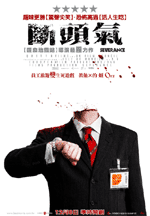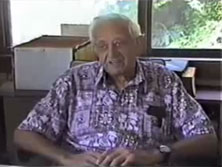
Language Log has had quite a few posts in recent months on the bleeping out of letters from obscenities. I’d like to add here an example of something bleeped out of a string of Chinese characters.
The other day I noticed an ad on the side of a bus for the forthcoming British slasher film Severance. (I didn’t get a good photo of this ad, so here I’m using an image of the poster for this movie.) In Mandarin this has the rather uninspired title of Duàntóu qì (斷頭氣: “Severed Head Qi“).
What really caught my eye, however, was the tag line in Chinese characters:
員工旅遊變生死遊戲 真他X的煩 Orz
This is interesting not just for the use of Orz, which is Net slang, but also for the bleeping out of the middle character of the obscenity tāmā de (他媽的, sometimes seen as “tamade“), rendering it 他X的. (Note too that a Roman letter rather than a Chinese character was used for this.)
There’s nothing obscene about the middle character by itself (媽). It’s used in writing words related to mā (“mother”). For that matter, there’s nothing in the least impolite about any of the characters by themselves or the individual morphemes they represent. The phrase as a whole literally means simply “his mother’s.” But as a whole the phrase works as something that youngsters would get into trouble for saying around their parents or elders and that would probably not be used on television (not without bleeping the subtitles, at least).
Lu Xun (Lǔ Xùn/鲁迅/魯迅) wrote a brief essay about the expression tama de. (For an English translation and notes of Lu Xun’s tama de essay, see Lu Xun on the Chinese “national swear”, an excellent post by Huichieh Loy of From a Singapore Angle.)
Back to the bleeping. As the results of Google searches show, 他媽的 and 他X的 are both common, though the original form is much more so.
| |
total of all domains |
within .cn domains |
within .tw domains |
| 他X的 |
98,100 |
22,700 |
6,960 |
| 他媽的 |
1,910,000 |
173,000 |
903,000 |
Note that .cn (PRC) domains have 23.14% of the total 他X的s but only 9.06% of the total 他媽的s. This difference is probably a result of China’s Net nanny culture. On the other hand, specifically PRC domains still have a lot of 他媽的s. (Or rather 他妈的s, using the so-called simplified form of 媽.) Taiwan domains, however, have more than five times as many, which in the spirit of this post I should probably call a fucking lot of 他媽的s.
Out of curiousity I also ran searches for the other letters of the alphabet and found a spike for the 他M的. The letter M serves here as an abbreviation for the ma of tama de. Accordingly, it’s no surprise to see that 他ma的 is also found and that both 他M的 and 他ma的 are relatively rare in .tw domains (since people in Taiwan aren’t taught romanization).
| |
total of all domains |
within .cn domains |
within .tw domains |
| 他M的 |
21,200 |
4,220 |
128 |
| 他ma的 |
12,400 |
2,620 |
168 |
To my surprise, I also came across a lesser spike for the use of the letter Y: 他Y的
| |
total of all domains |
within .cn domains |
within .tw domains |
| 他Y的 |
8,450 |
1,520 |
14 |
The 他Y的s are mainly referring to a sadistic Flash game Pìpì chōu tā Y de (屁屁抽他Y的).
But it appears this isn’t really intended to be the letter Y from the Roman alphabet. Instead, Y appears to be used in place of zhuyin fuhao’s similar-looking ㄚ, which represents the sound that Hanyu Pinyin assigns to the Roman letter A. Thus, 他Y的 is not read “ta Y de” but more like “taaa de.” (See Some Things Chinese Characters Can’t Do-Be-Do-Be-Do.) Oddly enough, there are thousands of pages with 他Y的 (Roman letter Y) but just a handful with 他ㄚ的 (bopo mofo ㄚ). This may be from the relative ease of typing the letter Y instead of zhuyin’s ㄚ. Another odd result is that many of the 他ㄚ的s are within .cn domains but in traditional Chinese characters. [Later addition: See the comments for clarification on this.]
Since the subject of zhuyin fuhao came up, I made some additional searches:
| |
total of all domains |
within .cn domains |
within .tw domains |
| ㄊㄚㄇㄚㄉㄜ |
0 |
0 |
0 |
| 他ㄇㄚ的 |
142 |
0 |
55 |
| 他ㄇ的 |
3,820 |
16 |
1,410 |
| ㄊㄇㄉ |
408 |
0 |
2 |
“TMD” is another extremely common way to indicate tama de. But too many unrelated results turn up in searches for me to give useful numbers for this.
OK, I’m finally finished with this tama de post.
Permalink
 Ten years ago John DeFrancis was awarded the Chinese Language Teachers Association’s first lifetime achievement award. Since he could not be present at the association’s annual conference to receive the award, he sent a videotape of a 12-minute acceptance speech. The video was recently edited down to 6:27 and uploaded to YouTube: John DeFrancis remarks.
Ten years ago John DeFrancis was awarded the Chinese Language Teachers Association’s first lifetime achievement award. Since he could not be present at the association’s annual conference to receive the award, he sent a videotape of a 12-minute acceptance speech. The video was recently edited down to 6:27 and uploaded to YouTube: John DeFrancis remarks. 
